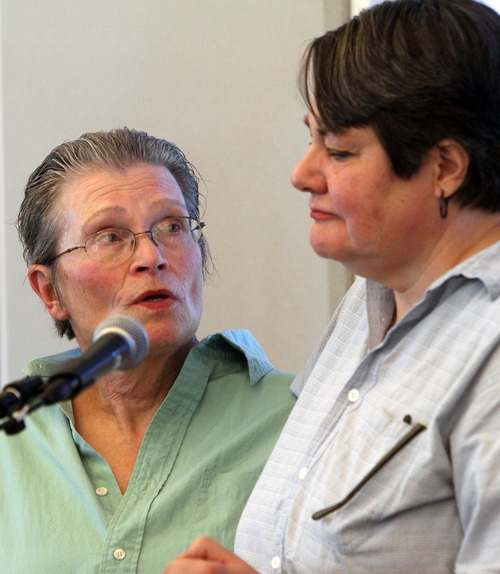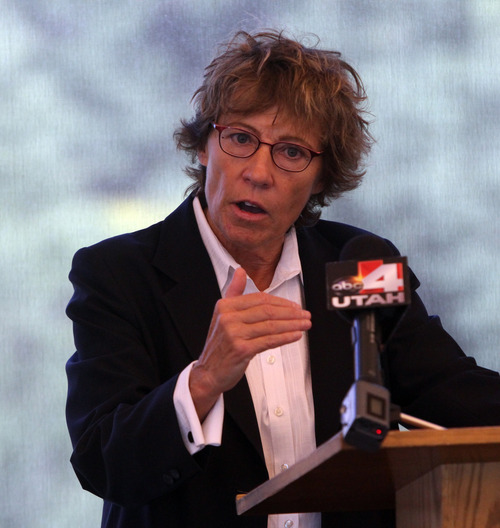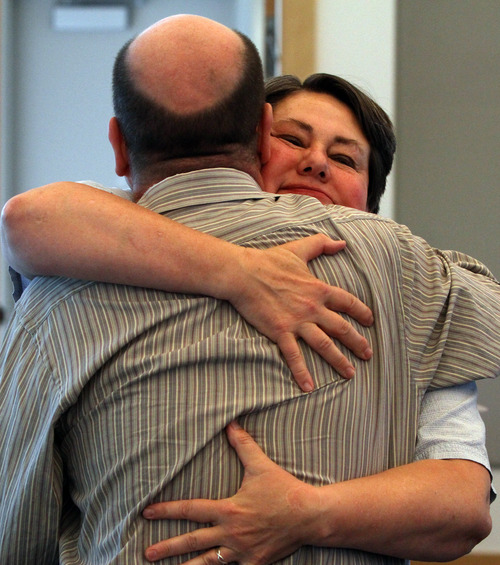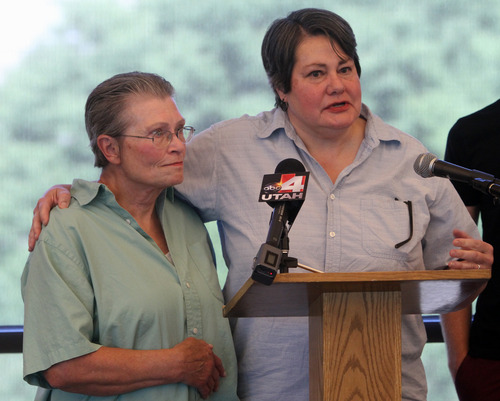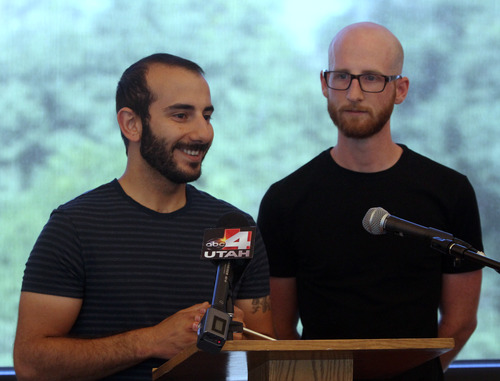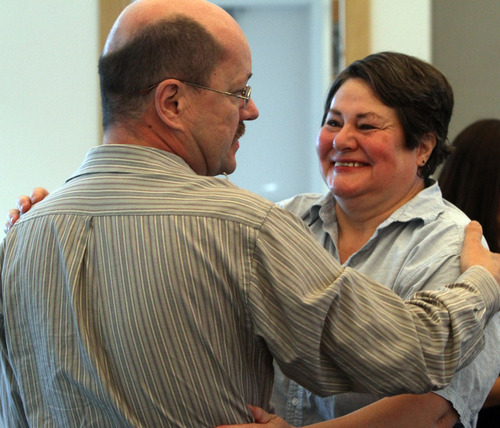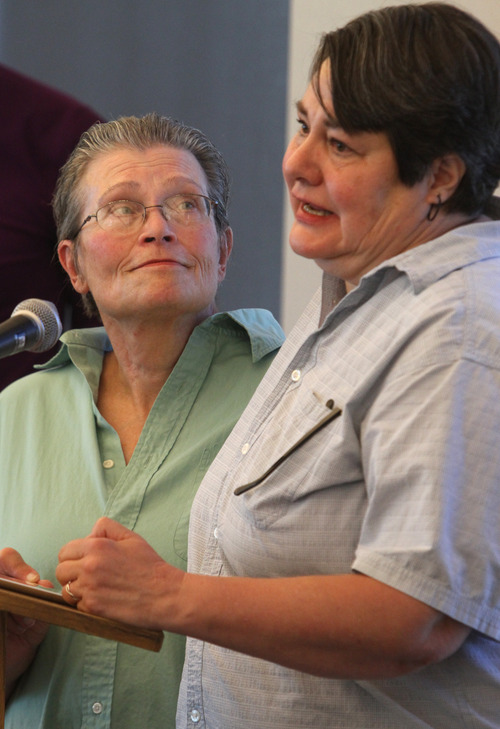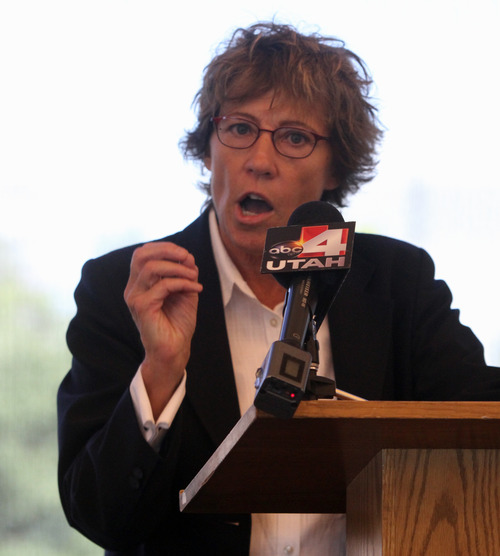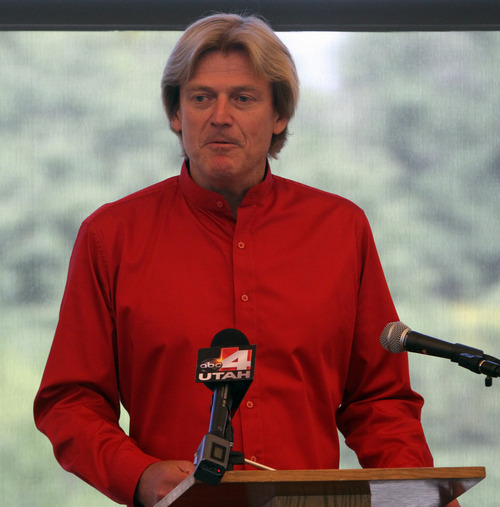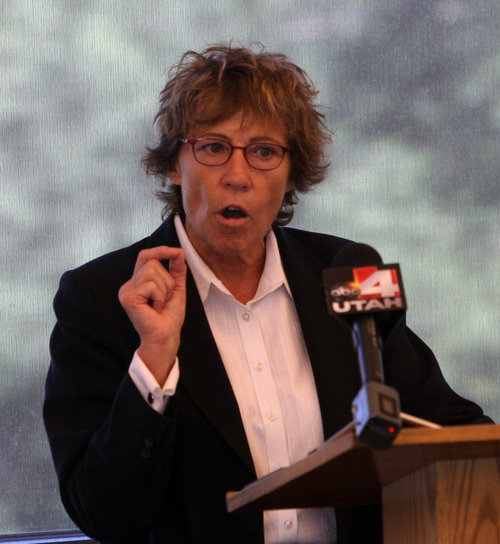This is an archived article that was published on sltrib.com in 2013, and information in the article may be outdated. It is provided only for personal research purposes and may not be reprinted.
When Kate Call and Karen Archer traveled to Iowa to marry in 2011, they knew their marriage would not be recognized in Utah.
"For a little while," Call said Thursday.
"Or ever," Archer added.
Now, after a pair of historic rulings by the U.S. Supreme Court, they and two other couples who are plaintiffs in a federal lawsuit are more hopeful than ever about their prospects of overturning Utah's ban on same-sex marriage.
"We are just ready for equality to come to Utah," said Derek L. Kitchen, who is a plaintiff with his partner, Moudi D. Sbeity.
A third couple, Laurie Wood and Kody Partridge, did not attend a Thursday news conference at the Salt Lake City Main Library discussing the lawsuit.
The couples filed the suit in March challenging Utah's Amendment 3, which added language to the state's constitution barring any recognition of gay relationships. They want a federal judge to declare unconstitutional any Utah law that prohibits against same-sex marriage.
The plaintiffs agreed to give the Utah attorney general's office 45 days after the high court ruled in two gay-marriage cases to file its response to the suit.
Utah Attorney General John Swallow has pledged a vigorous defense of Amendment 3.
On Thursday, during a Trib Talk discussion, Brigham Young University law professor Lynn Wardle said the high court's ruling in the Defense of Marriage Act case affirmed the right of states to regulate marriage, but conceded such bans are likely to be challenged by lawsuits like the one in Utah.
Restore Our Humanity is backing the court challenge, which also now has support from Utah-based Overstock.com.
Company founder Patrick Byrne said Thursday that Overstock will provide a "substantial" sum to help fund the lawsuit and will work to encourage additional financial support from others. Byrne said the state's stance on same-sex marriage is an impediment to economic development. Utah's reputation as a great place live and be an entrepreneur, he said, is marred by its role in the national debate on gay rights.
Byrne said he hears concerns "over and over" from potential out-of-state job applicants about what it is like to live in Utah and its stance on equality.
He recalled that more than a decade ago, after his company hired its first openly gay employee, Overstock executives took "about five seconds" before making a commitment to having the most "rainbow-friendly" workplace in the state. The company provides full benefits to same-sex couples, makes special accommodations for transgender employees and provides diversity education to all workers.
Mark Lawrence, director of Restore Our Humanity, said the group formed a year ago for the "sole purpose" of eliminating government discrimination embedded in Utah's constitutional amendment. He said the DOMA opinion "shredded" grounds for government-based bias.
"Now we are saying no," Lawrence said. "We are going to do the same thing with Utah's Amendment 3."
Peggy A. Tomsic, an attorney representing the plaintiffs, said the lawsuit is aimed at getting Utah to do "what is right and what is fair." States have the right to regulate marriage, provided those laws don't violate constitutional boundaries — which Utah's law does, she said, adding that there is much in the DOMA decision to draw on to bolster that argument.
"This lawsuit is about real people with long-term committed relationships," Tomsic said, "not about outsiders trying to tell the state what to do."
Kitchen and Sbeity began a food business four years ago. Being recognized as business partners has been easy; being legally recognized as a couple has not. They'd like to buy a house and settle down, Sbeity said.
"We don't plan to get married in any other state but Utah," Sbeity said. "We can't see ourselves living in any other state but Utah."
Call, a native Utahn, and Archer, who is originally from Colorado, said they married for the same reason most couples do: as a public declaration of their love, commitment and fidelity to one another. They traveled to Iowa because it was a short, affordable plane flight from Utah.
"We are disappointed that when we cross a state line, we become single again," Call said as she stood with her arm aroundArcher.
As troubling is the fact — for now — they cannot be recognized as a married couple for federal benefit purposes. Archer retired early from her career as an OB/GYN because of health problems. She wants her wife to be entitled to Social Security benefits if "something happens to me."
"Kate would be left without the benefits," she said. "That's not fair at all."


